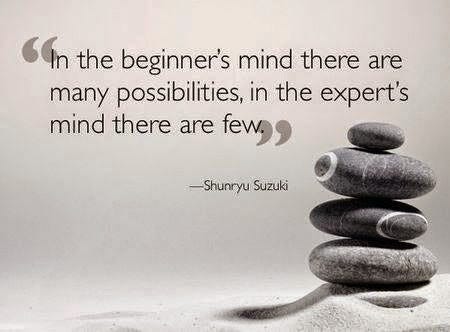Beginner's Mind

Before I meet a new client for the very first time, I remind myself of one most important thing. It is this - that I must shut up and listen - I am there to learn. Listen not with half an ear and half a mind on what I want to say next - no. Listen wholeheartedly, to the story, to the feelings attached to the story, and to the impact the story has had on the teller. If I say anything during the telling of the client's story, it might be to ask for clarification, or to check that I have understood something correctly. It's called 'holding space' and I think that's a really good way of describing what happens. As a therapist I have nothing invested in the space or in the client's life other than to have been engaged to support them, and I have no wish to guide them towards any particular outcome. If there is any 'expertise' involved, it is the ability to suspend judgement and to keep to myself what I might do in the same situation. The expertise of not knowing. Whatever I think I'd do is irrelevant. This is the counselling version of beginner's mind, and it's actually a lack of expertise in many ways.
So what next you might ask? The answer is I don't know. It could be any number of things. How long is a piece of string? For some clients, the very act of telling their story into the held space will enable them to hear it properly for the very first time. Some will hear something that they need to do, and will leave after just one session having gained some much needed clarity and a plan of action. Others may need more, sometimes a lot more, may need to explore it in more detail, or may need to settle and establish trust before the story telling can even begin. But the beginner's mind will not have a view about what should happen during the session. The space is held without a need to control how the client uses it.
This approach has brought me plenty of mockery and bashing from other mental health professionals, both in real life and on social media over the years. One person pronounced it "a load of bo**ocks" after I had patiently explained (when requested) the benefits of holding space. This is what I find myself up against, because for many people there is a preconception that you go to a therapist to consult an 'expert'. However, as I have explained, I have no expertise in the story, I haven't lived it. How therefore, can I be an expert when it comes to knowing what to do next? What would give me the right to think I knew best when it came to making choices on behalf of another about their emotional lives?
I can appreciate the problem certain 'expert' mindsets will have with this, and it is possibly made worse by the idea that mental health and physical health should be treated in the same way. This idea was encouraged by the 'anti stigma' campaigners, hopefully for the best of reasons, however misguided. Whilst I agree that both are equally important, beginner's mind is not a stance I could possibly encourage a GP or surgeon to adopt, as their expertise may be vital and life saving in many situations. That's not to say of course, that they don't need to listen. However, the idea that mental health professionals have all the answers is outdated and just plain wrong, as we begin to realise that the most commonly offered solutions are not really solutions at all in the way physical health solutions are.
The suppression of symptoms is often the best that can be achieved with the use of psychiatric medications, and sadly such medications can have a hugely detrimental effect on both a patient's physical and mental wellbeing. Recent scrutiny of the 'treatment' of patients using ECT (Electro Convulsive Therapy) has brought to light the huge difficulties faced by some survivors of this so called therapy, who have experienced a traumatic brain injury (TBI). Some survivors of ECT report losing their sense of who they are, along with their memories. The beauty of social media is that it allows us to share our stories, and I was struck particularly by the plight of a mother who was unable to recall the birth of her children or their early childhood because of the TBI sustained following ECT. Just imagining how isolated this woman must have felt, and how she felt excluded from conversations, despite her central role due to having no memory of what was being discussed certainly brought it home to me.
Sometimes the fear induced in families when a loved one is experiencing an extreme state, means that the family want something to be done, and quickly. And of course, the media don't help, ramping up the fears around 'mental illness', linking it to violence, and herding increasing numbers of people into services ill equipped to help in any meaningful way. But sometimes less is more. What is needed is a pause, a breathing space, a place of safety, to take stock of what is happening and why. To try and make sense of the experience in context, an opportunity that is often lost when restraint, isolation and medication are the lines of first response. And yes, if you've never seen anyone dissociate, hallucinate, or experience hearing voices, it can be frightening to observe. But understood in the framework of a stress or survival response, it can make perfect sense, and can be a huge learning experience, for both the person experiencing the extreme state and for those around them. We need to learn to be braver and more curious. There is so much to learn!

In an ideal world, services would be looking at providing places of safety, retreats, quiet spaces, therapeutic communities, alternatives to the fear inducing psychiatric units and instant medication, often by force. Before there is any opportunity to regain a sense of calm in order to understand what has happened. Particularly for those already traumatised by rape, sexual assault or abuse, it's not hard to see why this environment will actually compound the trauma. I don't know why anyone, particularly mental health professionals, would find that difficult to understand. Of course, the reality is that such spaces of retreat, where they have existed, have often been closed down due to austerity and cuts to services. I learned only this week that the two therapeutic communities nearest to me in Wales have been closed. This is a travesty - we need more such spaces, not less.


Comments
Post a Comment